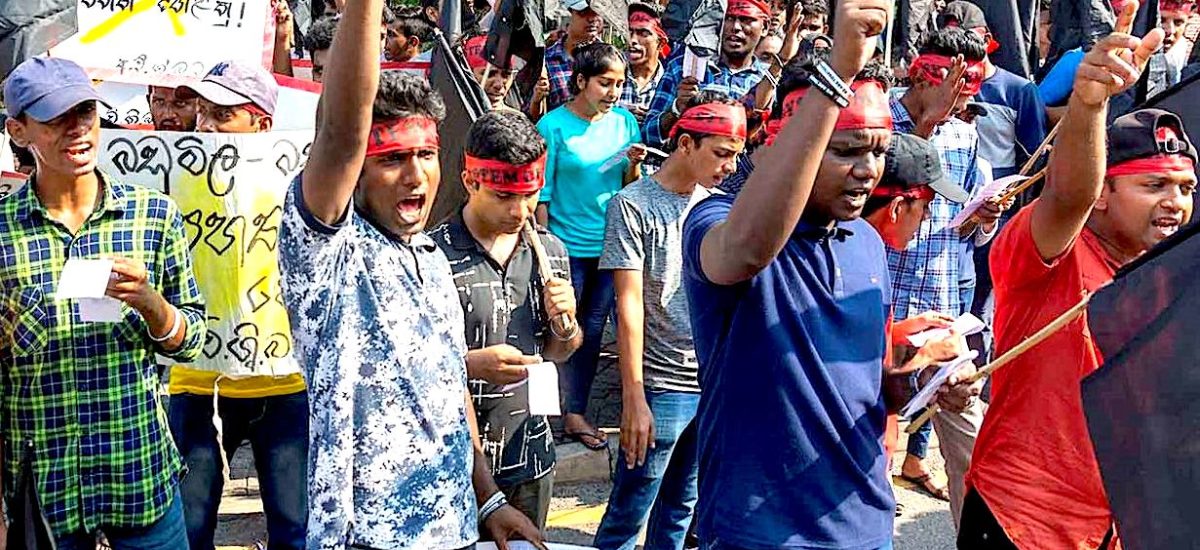Photo courtesy of WSWS
At major political failures, specifically when unpredicted crises break through, governments often use confusion as an instrument to make major political and economic changes. Leaders take advantage of chaotic times to subtly introduce economic policies that favor businesses such as privatization and deregulation. It’s like a playbook for leaders to follow when facing tough situations. The purpose of this article is to show why and how governments make significant decisions during crises. It also deals with how the country is governed at present according to the political and economic imperatives of the government.
In the recent turbulence, the intricate dance between democracy and crisis has come to the forefront. Examining the unfolding events through the lenses of Naomi Klein’s Shock Doctrine and Giorgio Agamben’s State of Exception [1] provides a unique perspective on the choices made by the government in these challenging times to advance neoliberal agendas such as privatization, deregularization and unjust taxation resulting widening wealth gaps, aggressive nationalism surveillance and erosion of civil liberties in understanding the evolving landscape of democracy during crises.
According to the latest report of United Nations Development Program (UNDP), one percent of the rich in Sri Lanka owns 31% of the total personal wealth while the 50% of the total population owns only less than 4% of the overall wealth. Thus Sri Lanka is a country where income disparity is very high. The UNDP reports reveal that during the post Covid-19 pandemic, wage cuts were legalized as necessary to maintain big business profits resulting a loss half a million jobs. Aggravating the crisis further, the government of Ranil Wickremesinghe imposed harsh austerity measures dictated by the IMF that led to worsening living conditions and social inequality. It is estimated that the IMF’s proposals resulted in sales, privatizing service oriented sectors and the closure of 430 public sector institutions, which will destroy another half a million jobs this year. Another significant neoliberal policy of the present government is the application of the high income tax together with VAT, which has been increased from 15 to 18 percent. VAT is applied to 97 essential goods including fuel and cooking gas. On the other hand, although corporate taxes are imposed on poor people, the taxes that should be applied on the elite multinational companies are not applied at the moment.
The UNDP report has warned of a re-emergence of a social unrest fueled by falling real incomes, including from tax rate hikes and cost recovery pricing in the energy sector, insufficient anti-corruption efforts and delayed local elections. The civic space of Sri Lanka in 2023 has been downgraded to repressed by the CIVICUS Monitor, an organization that tracks the status of civics space of the world. This grading is done considering the anti-democratic elements of the state such as attacks on protesters, harassment to journalists and intimidation of activists.
Analyzing the state of democracy during the crisis in 2023, CIVICUS Monitor highlighted the judicial harassment of human rights defenders such as human rights lawyer Priyalal Sirisena who received threatening phone calls from unidentifiable persons and standup comedian Natasha Edirisooriya who was arrested and charged under the International Convention on Civil and Political Rights (ICCPR) Act. Human rights lawyer Hejaaz Hizbullah was persecuted for his work while journalist and the human rights defender Ramachandran Sanath was summoned to appear before the Terrorism Investigation Department (TID) office in Nuwara Eliya. Journalist and reporter Tharindu Uduwaragedara was assaulted and unlawfully detained by the Borella police while he was covering a peaceful trade union protest in Colombo in July 2023. Excessive force of tear gas had been used by the police on the protesters, especially the students.
Intimidation of people from the Tamil minority seeking justice for war crimes in Northern and Eastern provinces is very much ignored by the majoritarianists backed by the economic and political elites. This aggressive nationalism is a powerful tool of neoliberal economic system that justifies the militarization. Land grabs and occupied resettlement of the Sinhalese in North and East are promoting Buddhisization. The latest instance is reported from Batticaloa where cattle farmers are protesting against the encroachment of outsiders, resulting the killing cows and setting on fire their lands. These facts confirm how the government violates the human rights on the pretext of democracy during crises.
In light of these observations, there are other anti-democratic actions that the government is implementing such as the Online Safety Bill and Anti-terrorism Act. It is evident that Sri Lanka’s democratic fabric is strained and the foundations of a just and inclusive society are being undermined. The aggressive pursuit of neoliberal policies during crises raises critical questions about the government’s commitment to the wellbeing of its citizens and the principles of democracy. As we reflect on these dynamics, it is imperative to call for a re-evaluation of policy choices that prioritize the equitable and sustainable development of the nation, fostering a democracy that truly serves the interests of all its people.
The government’s strategic exploitation of chaos as seen in the imposition of austerity measures, privatization initiatives and unjust taxation, underscores a concerning trend that prioritizes the interests of the elite while widening the wealth gap and exacerbating social inequalities. The instances of judicial harassment against human rights defenders and assaults on journalists reveal a blatant disregard for fundamental rights under the guise of crisis management. The aggressive nationalism employed by the government, coupled with its neglect of issues affecting minority communities, serves as a powerful tool within the neoliberal economic system. This not only justifies militarization, land grab and occupied resettlement but also perpetuates technocratic intimidation. This type of a governance is not good or healthy for a democratic country. The wellbeing of citizens is int danger and the narrow political ambition is promoted at the cost of sacrificing the innocent lives.
[1] Agamben, G. (2005). State of Exception. University of Chicago Press.

